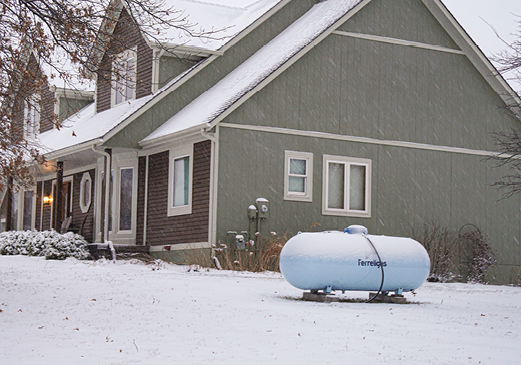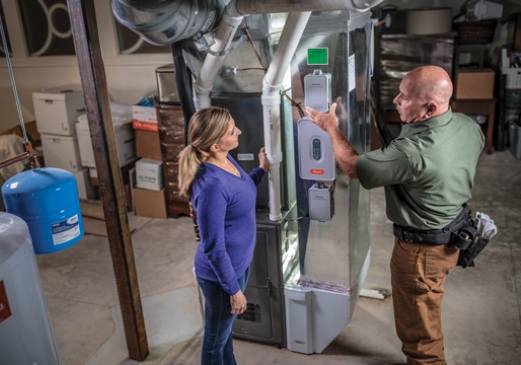Heating Your Home With Propane
What Is a Propane Heater?
Propane heaters are designed to convert propane from its liquid state into a gas and then disperse its chemical energy output in the form of heat. These heaters come in various forms, including wall heaters, space heaters, and central heating systems, and efficiently provide a source of heat perfect for residential or commercial use.

How Is Propane Stored?
Propane is stored in pressurized tanks, which can be placed above or below ground outside of the home or business. These tanks are designed specifically to store propane gas safely, and they come in various sizes to accommodate different usage levels.
How Big Are Propane Tanks?
Propane tanks come in many sizes. For heating needs, the right size will depend on how big your home or business facility is and how much heat you use. Our Customer Service Professionals can answer questions to help you choose the best option.
Who Owns My Propane Tank?
The ownership of propane tanks can vary. Some homeowners own their tanks and are responsible for tank maintenance. Others may lease their tanks from propane suppliers who handle maintenance. If you’re unsure, you can always check with your propane supplier or landlord.
How to Take Care of Your Propane Tank
Keeping your propane tank in good shape ensures safe, reliable heating all year long. Here are three ways to keep your propane tank in good shape:
1. Check Your Tank Regularly.
Ferrellgas professionals inspect your tank during refills to help keep everything running safely, but it’s also smart to take a look yourself from time to time. Watch for signs like dents, rust, or leaks. Propane has a unique odor, often compared to the smell of rotten eggs, to help alert you to leaks. Make sure everyone in your household knows what propane smells like. If you are unsure, ask your Ferrellgas professional. We are happy to help.
If you ever notice the smell of propane, take action right away. Your safety always comes first.
2. What to Do if You Suspect a Gas Leak
A propane leak is rare, but it can be dangerous. Here's how to respond quickly and safely:
-
Take action immediately. Leave the building or area without delay, taking everyone with you.
-
Turn off the gas at the tank if it’s safe to do so. Turn the main supply valve to the right (clockwise). If the leak seems to be coming from the tank itself, leave it to the professionals.
-
Avoid creating sparks. As you leave, do not touch light switches, outlets, appliances, or phones. Keep flames, cigarettes, and vapes away from the area.
-
Stay clear and call for help. Once you're at a safe distance, contact Ferrellgas at 866-708-8209, 911, or your local fire department.
-
Do not return until it is cleared. A qualified technician must inspect and confirm that your propane system is safe before you use it again.
3. Keep Your Tank Clear and Accessible.
Keep the area around your tank free from debris, snow, and tall grass. This makes it easier for technicians to access the tank for refills and inspections while reducing fire hazards.
4. Monitor Your Propane Levels.
Monitor your gauge regularly and schedule a delivery when your tank reaches 30% — or at least seven business days before you need propane. For a hassle-free option, sign up for Ferrellgas Auto Fill service level*. Our advanced system tracks your usage and schedules deliveries automatically, so you have propane when you need it.

Where Can My Propane Tank Be Located?
Propane tanks can be placed in various locations on your property, but they must comply to safety regulations. Common locations include backyards, above-ground, or buried underground. Most propane tanks must be at least 10 feet from a home or structure, but ultimately, the ideal location depends on your local regulations and your specific needs.
Underground or Aboveground: Which Is Right for You?
There are advantages and disadvantages to both aboveground and belowground propane tanks. Consider the following before making a decision:
-
Appearance
Underground tanks are hidden from view, preserving your property’s aesthetics. Aboveground tanks are more visible but can be concealed with landscaping or enclosures.
-
Tank Ownership
Underground tanks are only available to customers who own their tank. Leased tanks are installed above ground, which is also an option for customer-owned tanks. -
Accessibility
Aboveground tanks are easier to access for refills, maintenance, and inspections, making service quicker and more convenient. Underground tanks take more effort to reach, especially in snow or overgrown areas, but they are better protected from weather and accidental damage. Whichever option you choose, be sure to keep the area around your tank clear for safe and timely service. -
Installation Cost
Underground tanks are more expensive to install due to excavation and additional labor, while above-ground tanks have lower upfront costs. Customers can either purchase an above-ground tank or lease one. Leased tanks remain the property of the propane company, and installation costs are often covered by the lease agreement.
Whether you choose an aboveground or underground tank, Ferrellgas is here to help. Both options offer reliable propane storage, and the right choice depends on your budget, property layout, and personal preference. When you’re ready, you can count on Ferrellgas for expert maintenance, installation and dependable propane service.
Propane Heater Installation
Whole-home propane heaters require proper venting to the outside, which is complex to install correctly and should be left to a trusted professional to help ensure your safety and the effectiveness of your propane heater.
What’s the Difference Between a Furnace and a Boiler?
Furnaces and boilers are two common central heating systems. Furnaces use propane to heat air, which is then distributed through ducts. Boilers, on the other hand, heat water, which is circulated through radiators or underfloor heating systems. Both can be powered by propane, offering reliable and cost-effective heating options for your home.
BTU Comparison
-
Furnaces typically range from 40,000 to 150,000 BTUs.
-
Boilers can range anywhere from 50,000 to 200,000 BTUs.
-
The higher the BTUs, the more heat the system produces.
Cost Comparison
-
Furnaces often cost less to install but may use more propane over time.
-
Boilers cost more upfront but are usually more energy-efficient.
-
The best choice depends on your home size, insulation, and heating needs.
Advantages of Heating With Propane Gas
There are several advantages to heating your home with propane gas. Here’s why propane is a great choice for heating your home:
Energy EfficiencyPropane heating systems are highly efficient, providing quick warmth while using less energy. Clean BurningPropane is a clean-burning fuel, producing fewer emissions and reducing your carbon footprint. ReliabilityPropane is stored on-site, helping ensure a continuous heat supply, even during power outages. Cost-EffectiveWhile there are simple changes you can make to lower your energy bill, propane is often a more cost-effective energy source than electricity or other heating sources. VersatilityPropane can power a wide range of appliances, including heating systems, water heaters, stoves, fireplaces, and more. |
The Basics of Central Heating
Central heating systems are an efficient way to heat an entire home or business. These systems consist of a central unit, either a furnace or boiler, that distributes heat through ducts or pipes. They offer consistent and even heating throughout a space, making them a popular choice for homeowners.
If you’re new to a home with propane-powered heating, our propane homeowner’s guide offers a handful of helpful tips to get you acquainted.
Ready to Fuel Your Home with Propane?
Whether you’re new to propane or looking for a trusted supplier, Ferrellgas is here to help. You can count on our excellent service, quick delivery options, and reliable nationwide supply network. Contact us today to learn more about our delivery and service options.
Call your local Ferrellgas
for Propane Service.
*To qualify for Auto Fill, customers must be credit-approved, up to date on propane payments, and have an easily accessible tank. If you're unsure about eligibility, contact your local Ferrellgas office for details.
Sources
Boilers vs. Furnaces: What’s the Difference?, Family Handyman
How Much Propane Does a Furnace Use in a Day?, Logan Services A/C, Heat & Plumbing
Propane Furnaces, Propane Education & Research Council
The Biggest Differences Between Boiler Radiators and Furnaces, HomeAdvisor
CATEGORIES
Archives
- Winter 2025
- Fall 2025
- Summer 2025
- Spring 2025
- Winter 2024
- Fall 2024
- Summer 2024
- Spring 2024
- Winter 2023
- Fall 2023
- Summer 2023
- Spring 2023
- Winter 2022
- Fall 2022
- Summer 2022
- Spring 2022
- Winter 2021
- Fall 2021
- Summer 2021
- Spring 2021
- Winter 2020
- Fall 2020
- Summer 2020
- Spring 2020
- Winter 2019
- Fall 2019
- Summer 2019
- Spring 2019
- Winter 2018
- Fall 2018
- Summer 2018
- Spring 2018
- Winter 2017
